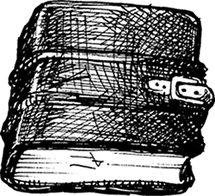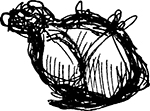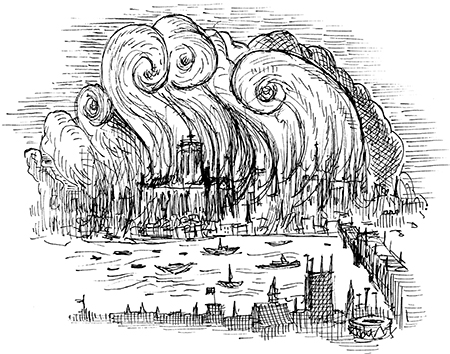
Rose, Isabella, Larry, and Neil jumped out of the SUV after an incredibly fast one-block trip. Jones stayed in the car to act as a lookout in case anyone was following them.
“Yes, in your giant black SUV you’re very hard to follow,” Larry joked. “I give it two minutes.”
“I can only hope,” Jones growled. Then he hit a button that slammed and locked the doors.
“Grump,” Rose said. She turned on her heel and marched through the gates of the Inner Temple Library. The others followed.
Isabella leaned in close to Neil. “Jones and Rose have a rather interesting history.”
“Boyfriend, girlfriend?”
“Not really,” Isabella said with a cryptic smile.
Rose led the way through the front doors.
An old man sat at a large desk, poring over sheets of aged papers with a magnifying glass. Rose marched up to him. “I’d like to see the archives for Clement’s Inn, please,” she said. “Do you have them here?”
The man nodded and held out his hand for Rose’s ID. She took a card from her pocket and held it up.
The man barely glanced at it, then waved them all through. Rose flapped the card in front of them. “Academic accreditation opens doors. Stay in school, kids.” Rose walked over to a huge carved wooden door.
There was a click, and the doors opened.
Isabella and Larry gasped. The library was beautiful. An arched ceiling rose above them. Huge leaded-glass windows filtered the murky daylight into the room, illuminating dozens of carved oak bookcases filled with leather-bound volumes.
Neil was more struck by the overwhelming smells of different kinds of paper, parchment, and mold spores that floated in the air.
The old man followed them inside and pointed to a row of bookcases at the back. An enormous stained-glass window took up most of the wall. “The record books for the old inns are back there. You’ll need to wear these.” He handed each of them a pair of white gloves. Then he walked back through the doors and closed them behind him.
“So where do we start?” Larry asked as they stared in wonder at the thousands of books.
“I’d suggest we each take a bookcase, and start by looking for books from before 1603.”
The bookcases seemed to Neil to get even more packed as she said this. “Ugh,” he said, reaching for the first book. It was a list of notable members of the Clement’s Inn, since the year 1547. Neil started running his finger down the stiff yellowed page.
“It’s not even in alphabetical order! This’ll take forever.”
“Shhhhh,” said the other three. “You’re looking for anything in the books that might have been left behind by Kemp,” Rose said.
Neil grumpily returned to the list, hoping to see a Kemp, Drake, or possibly even a Shakespeare listed somewhere. Nothing.
Meanwhile, Larry, Rose, and Isabella were carefully stacking books on an enormous desk. “I’ve divided them into decades,” Rose said. “Luckily, we only need to check stuff for about a fifty-year window.”
Neil felt himself nodding off. This was way too close to homework.
He leaned his head against the bookcase. His eyes closed. His breathing grew heavy.
With a jolt, he stood up straight. There were only a few things that could make Neil Flambé do that, and 99 percent of those were food. He had smelled something.
Neil took another deep sniff. He could smell the faintest, weakest scent of onion and cinnamon coming from a book on the top shelf. There might even be a molecule of garlic.
Now he was awake. The others were still sorting the books on the table, occasionally skimming through a volume to see if there were any obvious connections to the key code or to Shakespeare or Kemp.
Neil looked up. There was a rod that ran along the top of each case. A ladder was attached, with wheels to help it slide along. Neil grabbed it and slid it into position in front of him.
Larry looked over. He knew right away that Neil had smelled something. “What is it, boy? Trouble at the old mill? Woof!”
Neil ignored him and climbed to the top of the ladder, using his nose as a guide. Larry walked over and steadied the ladder as Neil reached his fingers farther and farther to his left. Finally, he was able to wrap his fingers around what he was sure was the right book.
It was very thin, wedged tightly in a series of much larger volumes. He almost lost his balance trying to pull it out. Larry quickly jumped up a few steps and put his hand on Neil’s back.
“Thanks,” Neil said.
“That’s what I’m here for.” Larry smiled.
Neil made his way back down the ladder and walked over to the desk. He sat down and opened the book. The cinnamon smell was especially strong now, and very fragrant. Neil almost felt like he was smelling the original cinnamon smell from the beginning of time. It was so fresh and pure.
“Wow!” he said.
“Did you find something?” Rose said, walking over.
Neil smiled. “A cookbook,” he said.

“Ah. Always good to focus on the task at hand.” She frowned. “I’ll just go back and do the real work, then?”
Neil checked the front piece. “It’s from 1599. So I’m doing exactly what you suggested.”
“Ha!” Rose scoffed. “Well, I suggest you check that book out fast and then get back to some real work, checking the legal ledgers.” Then she marched back to the shelves to grab some more books.
“She’s starting to get under my skin,” Neil muttered.
“Yeah, isn’t she’s wonderful?” Larry said.
Neil rolled his eyes and turned his attention back to the cookbook.
The first recipe was for a chewet pie, with a filling of raisins, orange peel, cinnamon, sugar, and exotic spices. He was amazed. He’d had no idea the cuisine at the time had been so rich.

He read on. There were recipes for oysters and roast mutton, and dozens of recipes for special aqua compositas, spiced and brewed drinks with “magik propertees.”
Neil started making mental notes. Maybe an Elizabethan feast was the best way to impress a monarch?
He turned the page to the beginning of a series of cheese recipes and stopped. There, scratched into the margin of the page in dark ink, was one word.
Capon.
“Capon?” Neil flipped through the pages. There were no handwritten words anywhere else.
“What the heck is that doing there?” he said out loud.
Rose looked over at him frowning. “What, found a recipe for wasting time?”
“Capon,” Neil said.
“Wasting capon, how lovely,” Rose said, turning back to the pile of books in front of her.
“The word ‘capon’ was written here in the cheese section. It’s handwritten on the edge.” Neil pointed at the page.
Rose took a look. “It certainly resembles the handwriting on the key-code note. Look at the swirl on that O.”
“What’s a capon? A kind of cheese?” Larry asked.
“Not at all. It’s a type of rooster. I was just thinking of cooking one for the Queen. It seems strange that someone would write it down in a chapter about cheese,” Neil said. “At least, without any other recipe ideas.”
“And I thought we were looking for a law book,” Isabella said.
“Maybe that’s what Kemp wanted Shakespeare to think,” Larry said.
“But really it was hidden in a cookbook?”
“Yes! Remember, it was a cheese reference that sent us here in the first place.” Larry beamed. “So Kemp is hiding another clue—capon—using the reference from the previous clue: cheese.”
Neil thought for a second. “But it seems a pretty obvious clue. I mean, wouldn’t somebody have noticed ‘capon’ was added in when they were looking at the book?”
Rose shook her head. “Not necessarily. Scholars and monks were always adding stuff in the margins, so this one wouldn’t stick out to an average reader. We only know what it is because we are looking for it.”
Rose pursed her lips. “Well, this is what we academics call a good working theory. Cheese leads to capon. Food. Food. Food. Seems you might be the right person to be on this case, despite all appearances to the contrary.”
“Thanks . . . I think,” Neil said.
“So what kind of a clue is ‘capon’?” Larry asked. “Maybe we’re supposed to cross-reference that with some rooster recipe here in the book?”
Neil flipped the rest of the pages in the book. “Weird. There’s only one capon recipe. But I don’t see any other words written in the margins.” He tapped his upper lip, thinking.
“Maybe the clue is something hidden in the recipe that we’re supposed to look for?” Isabella suggested.
Neil read the recipe. “It’s pretty basic. It simply says to make a sauce with onions, oranges, and spices, and then it says to watch the clock or else the meat will get cold.”
“That’s a weird line for a recipe,” Isabella said.
Larry smiled. “Are you sure that last bit wasn’t added in later?”
Rose ran out and grabbed the magnifying glass from the old shushing man. She carefully examined the script. “It is different. The ink is just slightly darker. Kemp, if he wrote this, tried hard to make this look the same as the original.”
“But why?” Neil asked. “He didn’t bother to do that with the word ‘capon.’ ”
Rose smiled. “It’s a reference. The Comedy of Errors, act one, scene two.” She called up the relevant speech on her phone and handed it to Larry.
Larry cleared his throat and put on his actor’s voice.
The capon burns, the pig falls from the spit,
The clock hath strucken twelve upon the bell;
My mistress made it one upon my cheek:
She is so hot because the meat is cold;
The meat is cold because
you come not home . . .
Isabella and Rose clapped.
Larry bowed.
“Certainly a comedy, and Larry knows all about errors,” Neil said, rolling his eyes.
“Ouch! Thou stabbest at me with thy wit!” Larry said.
Neil tried to connect the dots. “So the recipe book makes reference to capons. That leads to a quote that makes reference to a clock striking twelve. Kemp’s key-code poem makes reference to a clock. So I guess we need to go looking for a clock of some kind?”
“Tsk, tsk,” Larry said. “Jumping to conclusions. As with everything in this case, it’s not so simple. This line is just telling us we’re on the right track. But this quote doesn’t tell us a place to look next. So it’s pointing to another clue we have to find.”
Neil threw up his hands. “I give up. Can I just go home and cook now?”
“C’mon, cuz, stay with me. The first clue pointed to a line from a character Kemp played.”
“Falstaff,” Neil said.
“He can be taught!” Rose said, raising her hands in the air in mock celebration.
“Sometimes!” Larry said, mimicking her. “And that Falstaff line matched the first sequence of letters from the key code.”
Neil nodded slowly. “Okay so far.”
“That led us here to the Inn records, where the word ‘capon’ tells us we’re on the right track. Then that word leads us to the next clue.”
Neil pulled out his phone. “Let’s take a look at the key code again. The third sequence of numbers is three Is, which matches up perfectly with the lines from the comedy thing, whatever it was called.”
Rose and Larry groaned. “Comedy of Errors,” they said together.
“Whatever. So that means we’re on the right track.” They nodded. “And then we need to look at the next sequence to figure out where to look next.”
“Seems right,” Larry said.
“The next set of letters is IVIIII,” Neil said.
Rose considered. “Well, the first time we saw an IV, it referred to Henry the Fourth, Part Two.”
Larry nodded. “Yes. There are only four extra Is in this one. Hmmmm. You need at least two to refer to scene and act, which means it’s either Henry the Fourth, Part Two, act one, scene one, or Henry the Fourth, Part One, act one, scene two—IIII.”
Rose called up the script in her phone and passed it to Larry. “It’s the second option.”
“I know this one,” he said. “Young Hal—he becomes Henry the Fifth at the end of both plays—has a whole bit where he’s teasing Falstaff for eating too many rich foods and drinking too much, sleeping in.”
“Sounds like someone I know, and am sadly related to,” Neil said.
“Ha-ha. The lines are . . .
Thou art so fat-witted,
with drinking of old sack
and unbuttoning thee after supper and sleeping upon
benches after noon, that thou hast forgotten to
demand that truly which thou wouldst truly know.
What a devil hast thou to do with the time of the day?
“And in the next line Hal makes reference to a clock?” Isabella said.
Larry nodded and continued.
Unless hours were cups of sack and minutes
capons and clocks the tongues of bawds and dials the
signs of leaping-houses and the blessed sun himself
a fair hot wench in flame-coloured taffeta, I see no
reason why thou shouldst be so superfluous to demand
the time of the day.
“So do we need to find an old clock?” Neil asked. “Big Ben?”
Rose frowned. “Big Ben is like maybe a hundred and fifty years old. ”
“Looks older on the postcards,” Neil said.
“Put architecture on the list of things you should be paying attention to in school. And Big Ben isn’t a clock; it’s the bell inside the clock tower!”
Neil frowned.

Larry interrupted. “Forget the clock. I think that’s a red herring. Falstaff actually says in the scene that he doesn’t need a clock. He’s got the stars.”
“Okay, so where does that leave us?” Neil asked.
“Well, in the play, it leaves them chatting for a few more minutes.”
“About what?”
Rose smiled. “Two things in particular. They discuss what Hal will be like when he becomes king. Then they sit down and plan a robbery. Hal and Falstaff also make reference to honey, and capons. It’s like all the hints so far rolled into one scene.”
Neil considered. “So Kemp is sending Shakespeare a message about what?”
“We know he stole something. Falstaff even implores him not to hang thieves when he becomes king, although he does exactly that in Henry the Fifth.”
“So is the scene about robbery or about becoming a king?”
“The whole play is about how becoming a king changes you. It’s all about the weight of the crown, the demands of leadership.”
“So, fine, kingship,” Neil said. “But where does that lead us? Where was it supposed to send Shakespeare?”
They sat silently for a while.
Finally, Larry snapped his fingers loudly. “Aha! Hal ends the scene by saying he’s going to be different when he’s king. And back then you only got to be king in one place. Westminster.”
Rose took a second to consider and then said, “It’s possible. Each clue seems to contain a red herring, but then hints at some actual place to look. Although there’s not that much of Westminster left, except for the abbey.”
“Let me guess,” said Neil. “Another fire.”
Rose nodded and held up two fingers. “One way back before Shakespeare and one back when Queen Victoria was on the throne.”
Larry laughed. “Who built this city, arsonists?”
“No, lots of carpenters with lots of dry wood. But the abbey is stone, and it’s pretty much the same as it’s been for a thousand years.”
Neil rubbed his temples. “We’re sure Kemp is pointing at Westminster?”
Rose shrugged. “No, but there are a couple of other things helping us out. Hal became Henry the Fifth, one of the greatest English kings. He was buried in Westminster Abbey, the church that’s attached to the palace. His grave was a big tourist attraction, even in Shakespeare’s time. So we know he and Kemp could have visited the place. We also know that it’s still standing.”

Larry smiled. “As you said earlier, a working theory is better than nothing.”
“Let’s get going,” Neil said.
They reshelved the books and Rose led them back out of the library.
As they passed through the front gates, a thought occurred to Neil.
“Wait, isn’t Big Ben at Westminster?”
“Zip it,” Rose said, and she marched ahead toward the car.